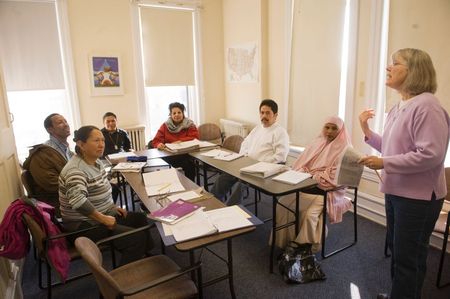Have you ever taught ESL to adults?
I have. For the past two years, I have taught a short-term English conversation class to Korean adults at the Andong City Library; the class lasted for 15 weeks in the spring and again in the fall. It has been a positive experience for me as I have been able to learn new skills and try different strategies. Teaching ESL to adult learners comes with its own issues, but also has some advantages that don’t come with teaching children.
One thing to remember when teaching adults, is that they’re autonomous learners, they have already acquired a set of study skills from their earlier education while growing up. Well, at least adults can read, write, speak and comprehend what’s being said to a better degree than children. Adults also show a greater desire to learn and practice what they’ve learnt, and will generally show up to class more often.
If you’re teaching a conversation course, assigning homework may be inappropriate as the focus is on speaking and listening comprehension more than reading or writing. If you’re teaching an adult course that incorporate all four aspects of language learning, then assign homework that’s appropriate to the level of the learners. Basic grammar and vocabulary worksheets may not help adults as much as comprehension worksheets.
Adults are motivated individuals
Adults generally enroll in ESL courses on their own for some sort of personal reason. They may need to learn English for their job, for travelling to an English-speaking country, or for their own personal enjoyment. There are various motivations behind why adults learn English as a second language, but whatever those motivations are, try to make the most of it. Find out what their goals are for learning English and find ways to make the classroom activities and other work help them reach their goals.
Another thing to do, is have them speak about their experiences growing up, schooling, job, etc. in English. Adults, especially older adults, are a wealth of knowledge. In the adult class I teach, there is a 76-year-old woman who has such an interesting life story. It’s so fun to hear her speak about her life in the class. Other adults, too, have interesting tales to tell. Some books and materials with set topics, while helpful, can seem elementary at times and may focus too much on grammar or vocabulary and less on actual conversation and listening comprehension. If you’re going to have a set topic for the class, make sure it’s one the students can relate to and speak about without hesitation. Vocabulary is important and it helps to teach a few new words and expressions that relate to that topic. Dialogues about the topic also help students utilize their new vocabulary skills and reinforce memory skills.
The challenges
As I stated earlier, teaching adults comes with its own set of challenges. One of which is time; adults usually don’t have much time to study because many have a full-time job or stay home and take care of the house while their kids and spouse are away. One way to overcome this challenge, is to give the adult students short tasks to complete while they have free time. It could be something small as memorizing small phrases or words, or watch a short video and write a summary.
Another challenge is the frustration that comes with learning something new at a later stage in life. Many adult ESL learners tend to be very self-conscious, and are afraid of making any sort of mistake. The best thing to do, as a teacher, is to encourage them to try. Say it’s okay to make a mistake, because those can be fixed later. Having adult ESL students just practice speaking English is the first and foremost step; the vocabulary and grammar can come later. Adults may be frustrated that they aren’t progressing as quickly as they had hoped, but tell them to not give up. Progress usually is slow, but as they learn more words and expressions, they will gain more confidence to speak English.
How can we help them?
First, help the students set realistic goals for learning English. Since adults’ brains are less flexible than children’s brains, it’s more difficult to learn brand new material (such as a second or third language). Since that’s the case, their goals should reflect how they want to use the language. The vocabulary and expressions should be tailored to their needs (when possible). As adults probably won’t lose their native accent, they won’t be able to pronounce every English word correctly or accurately, but that shouldn’t deter them. Have them get as close to the correct pronunciation as they can with words that are difficult for them. For Asian adult learners, the r/l, and f/p/v phonemes are difficult for them to properly pronounce. Have them work in small chunks of time on difficult words.
Secondly, have them review what they’ve learned as often as they can. Repetition is key to learning new words and phrases; once they have a few words and phrases memorized have the students practice speaking them in class. It helps if they are able to track what they’ve learned over the course of the month/year.
Finally, learn from them. Adults have so much to contribute to the learning process with their skills and knowledge. Give them chances to speak about what they like and you’ll learn something new.







Great post! I love teaching adults, and I prefer thisbto teaching children. With adults, u’ll definitely learn sometghing from them, too. E.g.,There were 2 years in my teaching practice, when I didn’t really need to watch the news-2times a week I got all the news, and with professional comments, from one of my students!
LikeLike
Thanks for the comment and reading the post. I like teaching adults but personally I still prefer kids. Both groups have their own advantages and disadvantages.
LikeLiked by 1 person
I agree with you, Martin, teaching adults has its advantages but what a wonderful challenge. Children are great too! Their minds are so open and ready to absorb as much as possible. Throughout my teachings (and learning as an ESL teacher), the way in reaching students is making the lesson about them, and not about the teacher.
Great source of insight! Thanks!
LikeLike
Thanks for the comment and dropping by!
LikeLike
Reblogged this on Ms Kaye's Online English Corner.
LikeLike
Reblogged this on Ahufstaderblog and commented:
All volunteer teachers should read this.
LikeLike
An owsum post indeed!!! Well I love teaching children but then I had no idea at all about teaching adults;but given a chance,I took the post and yeah really enjoyning it right now.Alternatively,it comes with a huge change.Too many questions yeah.
Great source displayed.
LikeLike
Thanks for the comment and stopping by my blog. I also enjoy teaching children but my experience teaching adults is also valuable. Keep learning and teaching!
LikeLike
Hello, I am going to teach adult ESL learners conversation class. It’s is my first time teaching ESL, conversation, and adults. Do you have any first time lessons or any type of format, or curriculum guide? Thank you for the post. My email is Misspham@icloud.com.
LikeLiked by 1 person
Thanks for stopping by and commenting! I will do what i can to help!
LikeLike
Thank you. Also, I am in Seoul! I am teaching through epik in yeongdeungpo. my kakao id is linhsang. Thank you so much for responding! You don’t know how grateful I am. ^^
LikeLiked by 1 person
You’re welcome! Also, welcome to Korea! Haha! My Kaokao id is just “ketan hein”, feel free fo add me and message if you have questions or just wanna chat! Good luck!
LikeLike
Reblogged this on egcloyd.
LikeLike
Really interesting post. I teach adults in French companies and one thing I would say is don’t shy away from getting creative with your lessons. Adults respond to a rich and varied lesson plan just as much as children and adolescents.
I totally agree with you about time being an issue. Learners frequently miss their lessons because they are called to a last minute meeting or have to sort out an urgent problem. Perhaps this wouldn’t happen so much if the lesson was at a neutral meeting point like a language centre, rather than in the workplace. In relation to homework, I play it by ear with my learners. Some of them love to work on exercises in their free-time but with others it’s a no-go.
LikeLiked by 2 people
Thanks for commenting! I’m glad you enjoyed the post! Teaching adults comes with its own challenges. I hope you continue to teach well!
LikeLike
Reblogged this on ELT iCenter.
LikeLiked by 1 person
Thanks for reblogging this!
LikeLike
Reblogged this on Sweet Scratch and commented:
Great post ! Thank you for sharing your experience ! 😀
LikeLiked by 1 person
Thanks for stopping by and reblogging! I really appreciate it.
LikeLike
Hi there, Thanks for liking my blog post. Although I am not teaching in the classroom, I am writing for adult English students and their teachers. Your blog gives me some good ideas.
LikeLiked by 1 person
I was teacher in Miami, Florida 33 years. Flooded recent immigrants Spanish and Haitian. We did get required minimum ESL but class size too large to give teenager proper attention. I did use history books in their own language(I know, not ESL protocol) to give them some sense of participation and not feeling so lost. Thanks visit my blog.
LikeLiked by 1 person
That’s interesting!! I’d love to hear more about your experiences. Thanks for commenting.
LikeLike
Hello, I am going to teach adult ESL learners conversation class. It’s is my first time teaching ESL, conversation, and adults. Do you have any first time lessons or any type of format, or curriculum guide? Thank you for the post. My email is flaviaestrada12@hotmail.com
LikeLiked by 1 person
Hi Elizabeth. Sorry for the late response! I’d love to share some advice and lessons with you when I have time. When do you start your class? If you’ve already started, how else can I help?
LikeLike
I start next month on the 12th
LikeLiked by 1 person